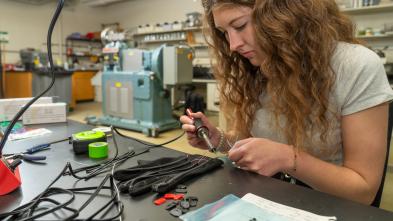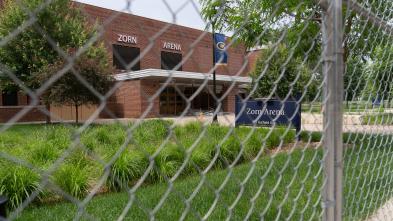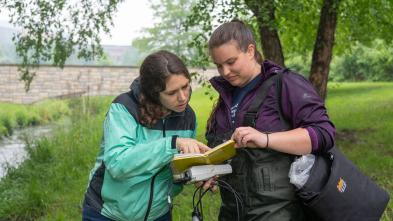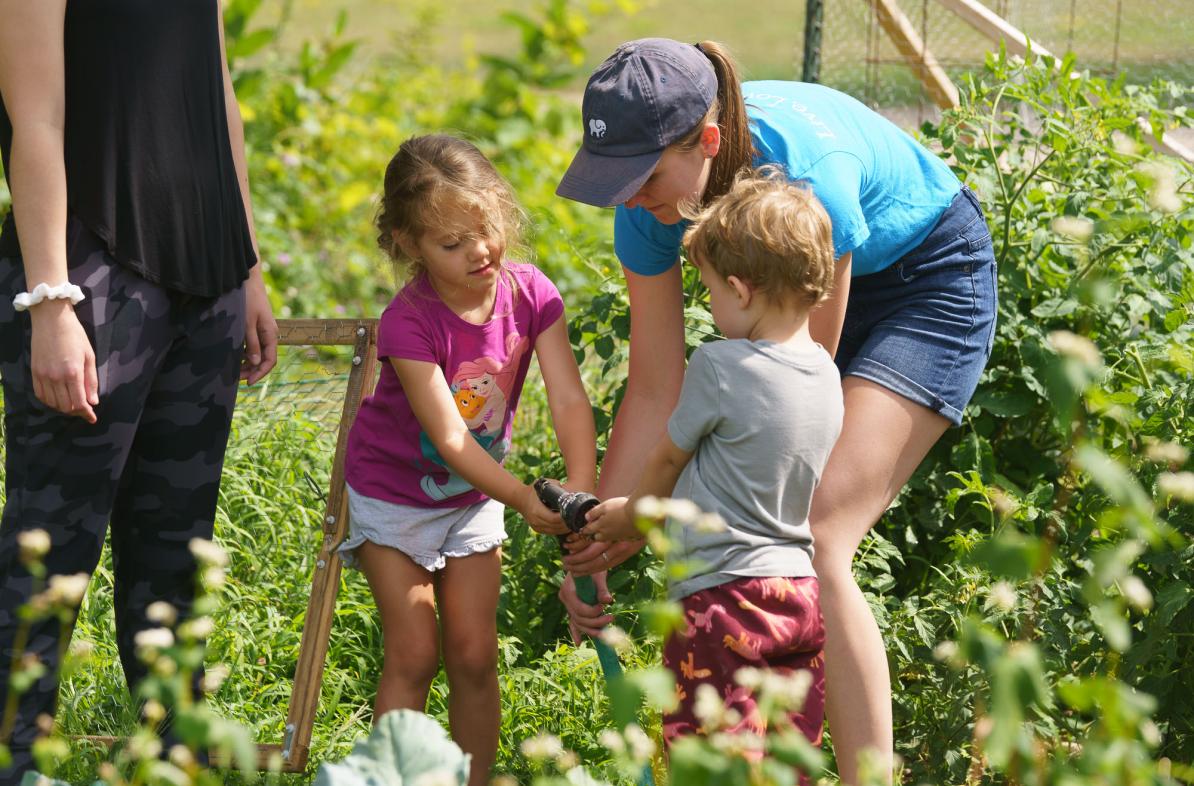
University gardening program helps community members build speech and language skills
After COVID-19 shut down the University of Wisconsin-Eau Claire’s in-person speech clinic a couple years ago, communication sciences and disorders faculty were eager to find a safe way to meet the needs of their student clinicians and the community members they serve.
Thinking creatively, they began a gardening project, bringing faculty, students and community groups together in an outdoor space that encourages natural conversation and camaraderie.
“The summer garden groups are a great way to get our clients together outdoors to work toward a common goal,” says Megan Figg, a clinical instructor in communication sciences and disorders. “Also, our clinicians need to earn client therapy hours, and this is another way to do this during summer.”
Given the “overwhelmingly positive feedback” from students and clients, faculty are continuing the project again this summer, Figg says.
This year, CSD faculty, students and community group members of varying ages and needs are meeting weekly to tend to the vegetables, fruit and flowers they’re growing in two plots in the Forest Street Community Garden in Eau Claire. Three faculty members supervise the groups, with each group including one or two student clinicians and multiple community clients.
Figg supervises a pediatric community group that includes two young clients and their parents as well as student clinicians. The kids enjoy seeing how the garden grows from week to week, and they always are eager to participate, Figg says.
“We talk about the different vegetables and incorporate language and vocabulary into our group time,” Figg says. “While we are growing and tending the garden, our clients are working on a variety of communication skills in a more natural setting.”
Since the garden is thriving, the kids are harvesting some vegetables, “so everyone has something to take home that showcases the work they’ve put into the garden,” Figg says.
Figg says the student clinicians also benefit greatly from the garden project because it gives them experience working with groups in a natural environment that requires them to use their creativity to help their clients work on various communication skills.
The garden project is “extremely worthwhile and valuable” for students, says Dr. Tom Sather, an associate professor of communication science and disorders. By seeing how communication occurs in a less controlled setting, students can “see how communication may break down and also how communication can be supported,” he says.
“Rather than set up or create a scenario or communication task in a traditional clinic office setting, the garden has tons of authentic contexts for communication,” Sather says. “We communicate about how we should set up the garden, what should be planted where or what tools we need. The vocabulary is right there, and the situation is authentic.”
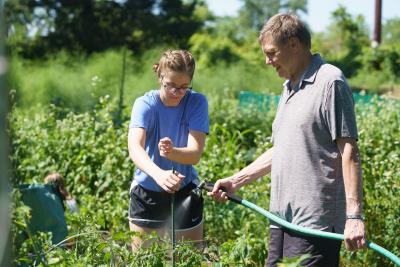
Savanna Slettom, a second-year CSD graduate student from Little Falls, Minnesota, appreciates the opportunity to be part of a “different sort of therapy experience.”
“Having clinic rooms and a space available to do therapy is great, but it isn’t a natural environment,” Slettom says. “The more natural/functional the environment and therapy activity, the greater likelihood what we are working on in therapy will carry over outside the clinic room. Working in the garden is a project-based intervention that is natural and functional as well as fun. We take care of the garden while also working on our speech and language goals.”
Sarah Gifford, a second-year CSD graduate student from Waconia, Minnesota, agrees, saying it’s important to create opportunities for clients to practice communicating, socializing and problem-solving in a setting outside of a traditional clinic setting.
She also appreciates that she and other student clinicians can work with different populations during the summer project, says Gifford, who is in the Kids Communicate Garden Group and the BluGold Aphasia Group.
The BluGold Aphasia Group consists of adults who have aphasia, a language disorder often caused by a stroke that makes it difficult for people to understand language or produce spoken language. When the aphasia group gathers each week, members spend most of their time tending to the garden, but they also enjoy a variety of other shared activities, Gifford says.
“When we aren’t busy weeding, watering, repairing fencing and/or harvesting, we spend time socializing and doing crafts, such as painting rocks for #Rockingaphasia,” Gifford says. “It is a fun social outing for group members.”
The aphasia group members consistently indicate how much they enjoy the garden project, Sather says, noting that many members are gardeners who cut back due to their stroke or progressive aphasia. They like getting out of the house, spending time outdoors, being around people they enjoy and working on something that produces tangible results, he says.
The garden also is a way for people with aphasia to provide a genuine service because their work and expertise put them in a different role than just receiving therapy, Sather says. They contribute to the garden, but also to students’ knowledge about gardening and communication, he says.
Working with the pediatric garden group is a different, though equally rewarding, experience, Gifford says.
“With the preschoolers, we spend time leading fun outdoor activities and crafts that help them practice producing different speech sounds,” Gifford says. “When we are not practicing our speech sounds, they take turns watering the different rows in the garden, weeding and harvesting vegetables. So, they are developing their speech and language skills, but get to have a lot of fun while doing it.”
Alana Petz, second-year CSD graduate student from Arcadia, is a clinician for the literacy garden group, which supports late elementary and middle school students as they build their reading and writing literacy skills in a “low-stakes environment” with their peers.
During their weekly meetings at the garden, the youth discuss readings related to gardening concepts, such as irrigation, composting or mulching, Petz says. They also practice their oral skills during “low-pressure” mini presentations that relate to gardening topics. These activities help give them the foundation they need to build their skills in oral language, vocabulary, background knowledge and making connections between ideas, she says.
Group members also water and weed the garden, which Petz says “fosters a sense of community and teamwork.” Also, the garden project gives kids and their families a chance to meet other community members while participating in “something bigger than themselves,” she says.
“It is truly rewarding to be a part of a program that brings people together and makes learning and skill building a fun journey,” Petz says of the group.
Part of the fun, Sather says, is doing things at the garden that go beyond gardening. For example, they participated in #RockingAphasia, an international aphasia awareness campaign that involves aphasia groups from around the world painting small rocks and writing something about aphasia. The rocks are placed in locations around the world and shared on a Google map through Twitter.
“We painted several rocks during our garden group, and placed several within our garden,” Sather says. “We also had gardeners from other plots ask to have a rock placed in their garden. It’s a great way to spread awareness about aphasia.”
Community speech-language pathologists and UW-Eau Claire CSD students also led “aphasia art in the garden” sessions, which Sather says “were pretty magical.”
Gifford says the insights she’s gaining from interacting with her two groups will help her be more successful in her future career.
For example, a member of the aphasia group told Gifford she enjoys the gardening project because it gets her out of the house and allows her to spend time with other people who have similar impairments. Others in the group made similar comments, helping her see how important social connections are to building a strong support system within a community group.
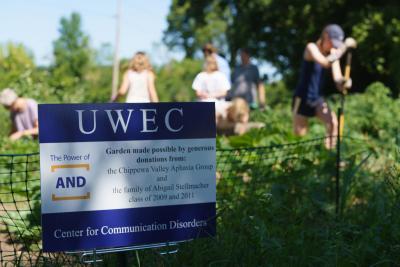
“A common thing I’ve heard from group members is that they’ve all felt alone in their struggles at some point,” Gifford says. “In each case, being a part of a support group helped them find solace, joy and purpose again. Knowing this will help me as I advocate for and seek out opportunities for clients to be involved in community/support groups.”
As a growing clinician, Slettom says the garden project is helping her better understanding how valuable it is for a group to share activities while working toward a common goal. Group members “really enjoy working together and getting their hands dirty,” Slettom says, adding that they also are enjoying seeing the garden grow throughout the summer.
“It started out as this little plot of dirt, filled with weeds,” Slettom says of the community garden. “Through hard work, we have tamed most of the weeds and been able to grow a lot of produce, which members then get to take home and enjoy with their families.”
The shared project has fostered a sense of community within the group, something that couldn’t be easily replicated in a more formal setting, Slettom says. The garden is a place to practice speech and language, but it also is a place to share space and to support one another, she says.
“The main thing I’ll take away from my time working in the garden is the value of support networks, and how meaningful conversations and social connections can start by picking weeds,” Slettom says.
The project also has helped Petz become more aware of how important it is for clients to make connections with other people who have similar experiences, and for them to be part of something that gives them a “sense of purpose and accomplishment.”
“At times, my clients and their family members expressed that they feel secluded and alone when it comes to the daily challenges they encounter,” Petz says. “Group services and project-based interventions satisfy their need for socialization and engagement with others who understand what they are going through.”
The students say having many opportunities to be part of real-world learning experiences that connect them with the community are why they came to UW-Eau Claire for their CSD graduate studies.
“I liked how the CSD program strives to provide its students with multiple opportunities to be involved in community outreach programs,” Gifford says. “They challenge us to think critically about the services we provide while also giving us the necessary support and guidance to be successful on our own.”
By continuously expanding its reach within the Chippewa Valley through speech and language services, UW-Eau Claire is making “a lasting positive impact” on people of varying ages and needs throughout the region, Petz says. It’s an honor, she says, to be part of something so meaningful.
Calling it a “really valuable experience for everyone involved,” Figg hopes the community garden project will continue in future summers.
Sather agrees, noting that faculty, students and group members all have “learned that there’s something special” about the garden environment. “There was enthusiasm, a sense of pride and a sense of accomplishment,” he says.
Funding for the gardening project came from the family of Abigail Stellmacher, who earned her degrees from UW-Eau Claire in 2009 and 2011; the Chippewa Valley Aphasia Group; and monetary and plant donations from group members, students, staff and faculty.
You may also like
